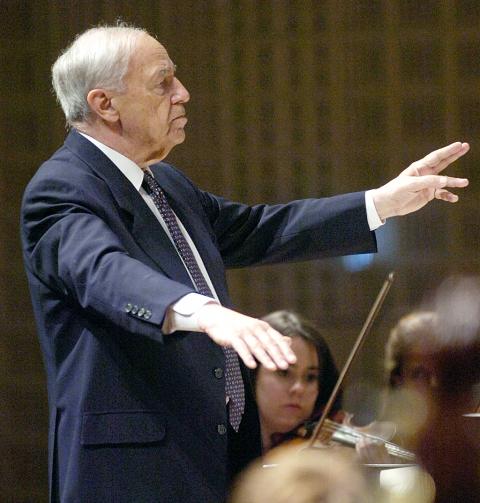World-renowned French conductor-composer Pierre Boulez, one of the most influential voices in modern classical music, and who was no stranger to controversy, has died aged 90, his family said on Wednesday.
A seminal figure in abstract music, Boulez constantly pushed the envelope by challenging the status quo, once suggesting: “We should burn down the opera houses.”
It was not that he disdained opera, but rather that Boulez, who died on Tuesday in Baden-Baden, Germany, felt that operatic productions had become too amateurish and catered too much to popular demand.

Photo: Sigi Tischler/EPA
“He helped open minds and hearts to new musical forms,” former French minister of culture Jack Lang said. “He really invented a unique musical language.”
Intrigued by maths, Boulez composed about 30 often demanding works, notably Le Marteau Sans Maitre (“The Hammer Without a Master”), which drew inspiration from surrealist poetry.
Several works he labeled “works in progress” were to be modified as the performer desired.
“He was a central player in the forward march of the music of our era, the music that ... we would be playing tomorrow,” Paris Opera director Stephane Lissner said.
Boulez conducted some of the world’s top orchestras, leading the BBC Symphony Orchestra and the New York Philharmonic, where he was musical director from 1971 to 1977.
Top US orchestras on Wednesday dedicated performances to Boulez.
Alan Gilbert, his successor as music director at the New York Philharmonic, described him as a “towering and influential musical figure whose Philharmonic leadership implicitly laid down a challenge of innovation and invention that continues to inspire us to this day.”
The Cleveland Orchestra released a video medley of segments from a 90th birthday concert last year in honor of Boulez, who had led the institution in more than 220 performances.
Boulez “has created a peerless legacy of great music, new music and unrivaled music-making,” it said.
The Boston Symphony Orchestra observed a minute of silence at rehearsal on Wednesday with visiting French conductor Francois-Xavier Roth.
“The greatest composer of our time is gone. Thank you, Pierre Boulez,” Roth wrote on Twitter.
Boulez’s conducting style was legendary. Shunning the baton in favor of his hands, he used sharp, clear movements reminiscent of a traffic director.
Lissner, of the Paris Opera, called Boulez “one of the greatest composers of the 20th century” who had “left his mark on his era.”
Born on March 26, 1925, in the Loire Valley town of Montbrison, Boulez studied at the Paris music conservatory with Olivier Messiaen, a leading composer and organist who influenced his early works.
Boulez’s brusque statements added to his public image. In 1952, he wrote an essay titled [Arnold] Schoenberg Is Dead, vowing to take music to the next frontier a year after the death of his forerunner in atonality — music that abandons classical scales.
Boulez was invited by orchestras from Berlin and Vienna to Chicago and Cleveland, and despite his comment on opera, produced in the late 1970s a celebrated version of Richard Wagner’s The Ring of the Nibelung with French director Patrice Chereau.
It was his exasperation with the relative conservatism of the French musical world that led him to make his home in the German city of Baden-Baden before heading to London and New York.
However, he returned in 1974 to create an ensemble dedicated to contemporary music and the Institute for Acoustic/Music Research and Coordination.
He was the first musician named to the College de France, a prestigious research and teaching institute founded in the 16th century. From there he was associated with several major musical projects, such as the Cite de la Musique, inaugurated in 1995, and most recently the Philharmonie de Paris, whose inauguration last year he was too frail to attend.
Musicians worldwide have offered their remembrances of his singular talent in modern conducting and composing.
Julian Lloyd Webber, the principal of Britain’s Birmingham Conservatoire, tweeted: “Even if you didn’t whistle his oeuvres in the bath he certainly moved and shook!”
“He felt with his head and thought with his heart,” Argentinian conductor and pianist Daniel Barenboim said.
With his long dominance in classical categories, Boulez had won 26 Grammys and was saluted with a lifetime achievement award last year.

As we live longer, our risk of cognitive impairment is increasing. How can we delay the onset of symptoms? Do we have to give up every indulgence or can small changes make a difference? We asked neurologists for tips on how to keep our brains healthy for life. TAKE CARE OF YOUR HEALTH “All of the sensible things that apply to bodily health apply to brain health,” says Suzanne O’Sullivan, a consultant in neurology at the National Hospital for Neurology and Neurosurgery in London, and the author of The Age of Diagnosis. “When you’re 20, you can get away with absolute

When the South Vietnamese capital of Saigon fell to the North Vietnamese forces 50 years ago this week, it prompted a mass exodus of some 2 million people — hundreds of thousands fleeing perilously on small boats across open water to escape the communist regime. Many ultimately settled in Southern California’s Orange County in an area now known as “Little Saigon,” not far from Marine Corps Base Camp Pendleton, where the first refugees were airlifted upon reaching the US. The diaspora now also has significant populations in Virginia, Texas and Washington state, as well as in countries including France and Australia.

On April 17, Chinese Nationalist Party (KMT) Chairman Eric Chu (朱立倫) launched a bold campaign to revive and revitalize the KMT base by calling for an impromptu rally at the Taipei prosecutor’s offices to protest recent arrests of KMT recall campaigners over allegations of forgery and fraud involving signatures of dead voters. The protest had no time to apply for permits and was illegal, but that played into the sense of opposition grievance at alleged weaponization of the judiciary by the Democratic Progressive Party (DPP) to “annihilate” the opposition parties. Blamed for faltering recall campaigns and faced with a KMT chair

A police station in the historic sailors’ quarter of the Belgian port of Antwerp is surrounded by sex workers’ neon-lit red-light windows. The station in the Villa Tinto complex is a symbol of the push to make sex work safer in Belgium, which boasts some of Europe’s most liberal laws — although there are still widespread abuses and exploitation. Since December, Belgium’s sex workers can access legal protections and labor rights, such as paid leave, like any other profession. They welcome the changes. “I’m not a victim, I chose to work here and I like what I’m doing,” said Kiana, 32, as she